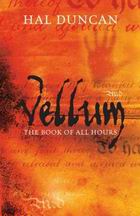Ex Libris: Telling the Story Sideways
The reviews don't do justice to Hal Duncan's Vellum. And I don't think mine will either.
No wonder. After reading Duncan's opus, I felt dizzy after his kaleidoscope run. And what a book it is. Even after reading it, I still have a hard time describing what Vellum is all about. But that's what you get when you have a big book of ideas: not just of concepts but also of stories. Pulp tradition, Lovecraftian, mythological re-telling, travelogue, etc.-- they're all here to take the reader on a whirlwind trip of the Story. Just when you figure out the familiar tropes of one story, Duncan sidesteps to another story.
Have I rendered you totally confused by now? Just as long as you hang on, you'll get it. Barely anyway. I know I did.
Basically, Vellum is Reality itself-- an eternity of all of the realities and universes actually (Duncan's homage to Michael Moorcock's Multiverse obviously). In one reality, it's 2017 and angels and demons called "unkin" are coming head-to-head in a War in Heaven to find out who's going to take over the head office. The angels, called the Covenant, wants law and order to prevail throughout Reality while their opposite number, the Sovereign, just want to be left alone (once more, shades of Moorcock's Order vs. Chaos). This war will include everything in their arsenal: the future in the Covenant's nanotechnology versus the past in the Sovereign's blood-magic.
In the midst of this war, the blue print of all reality, the book supposedly used by God to create Everything-- called the Book of All Hours-- has been found by a scion of a family that's made it their heritage to search for the said book. How this will connect to the main story, only Duncan knows, but it's a fascinating trip with the said scion visiting the varied universes and realities in all eternity.
Still with me? Good.
The number of characters can be counted in two hands but these characters... how do we say, are legion. Imagine juggling a number of counted balls:
- In one storyline, you have Phreedom Messenger searching for her lost brother, Thomas, while avoiding taking sides in the coming battle, especially as Metatron, the head of the Covenant, doesn't like fence-sitters;
- In another storyline straight out of Sumerian mythology, Phreedom is Inanna entering the Kingdom of the Dead and Metatron is Enki sending his henchmen to rescue her;
- A third storyline situated in a world literally populated by angels and devils, Metatron's henchman Jack Carter is a college student in love with a Puck-ish Thomas such that Thomas' violent death sends Jack careening around the bend;
- A fourth storyline, a mad Jack is Jumping Jack Flash, a rebel against the repressive government in a futuristic world reminiscent of Blade Runner, and...
...whew, that's only a few of the stories that abound in this book. And what makes this book brilliant is that all of these characters are the one in the same: once one is an "unkin", the character resounds throughout time and universe. When Jack is almost killed in a tattoo parlor fighting one of the Sovereign, all legends pertaining to a Jack-like character are almost erased.
I like how Niall Harrison puts it, calling it Duncan's "Grand Unified Theory of Story" though in this case, Harrison was referring to the story itself and not on the telling of the story. Still, I think that here, Duncan is not only presenting such a unified theory on story but also of the way the story is told. As unified as it can get anyway, considering everything Duncan is trying to cram into the book.
Unfortunately, noted review John Clute and even Harrison himself have noticed this and expressed distress over Duncan's style: too much yet too little. (And I remember Jay also described Duncan as a bit spread out in comparison to a work by Catherynne Valente.) However, I thought it was appropriate, given Duncan's off-kilter, helter-skelter, hell-on-wheels storyline. As a reader, you barely have time to breathe before he dunks into a completely different story again. It worked for me but I can understand why some might have problem with this.
The fact that Duncan uses a nonlinear way of telling all of the story also doesn't help; some have described this as the fantasy version of James Joyce's Finnegan's Wake. A pity as this would quite limit Duncan's audience.
Still confused? Don't be. I know I still am.
The gist of all of the above is this: this book is Speculative Fiction at its best. Either you can hang on or not. And that's all there is to it.
P.S. Now, I normally don't review a book that's not complete, Hal Duncan's Vellum being a duology. However, this was too good a book to pass up on and thus, this review. The second half of the story, Ink, is due this year.
P.P.S. I would have said that Vellum is my Book Read of the Year but what year? I selected Kelly Link's collection of short stories as my 2005 pick and 2006 isn't over yet. Ah well, I'll find out by next year I suppose...

No comments:
Post a Comment